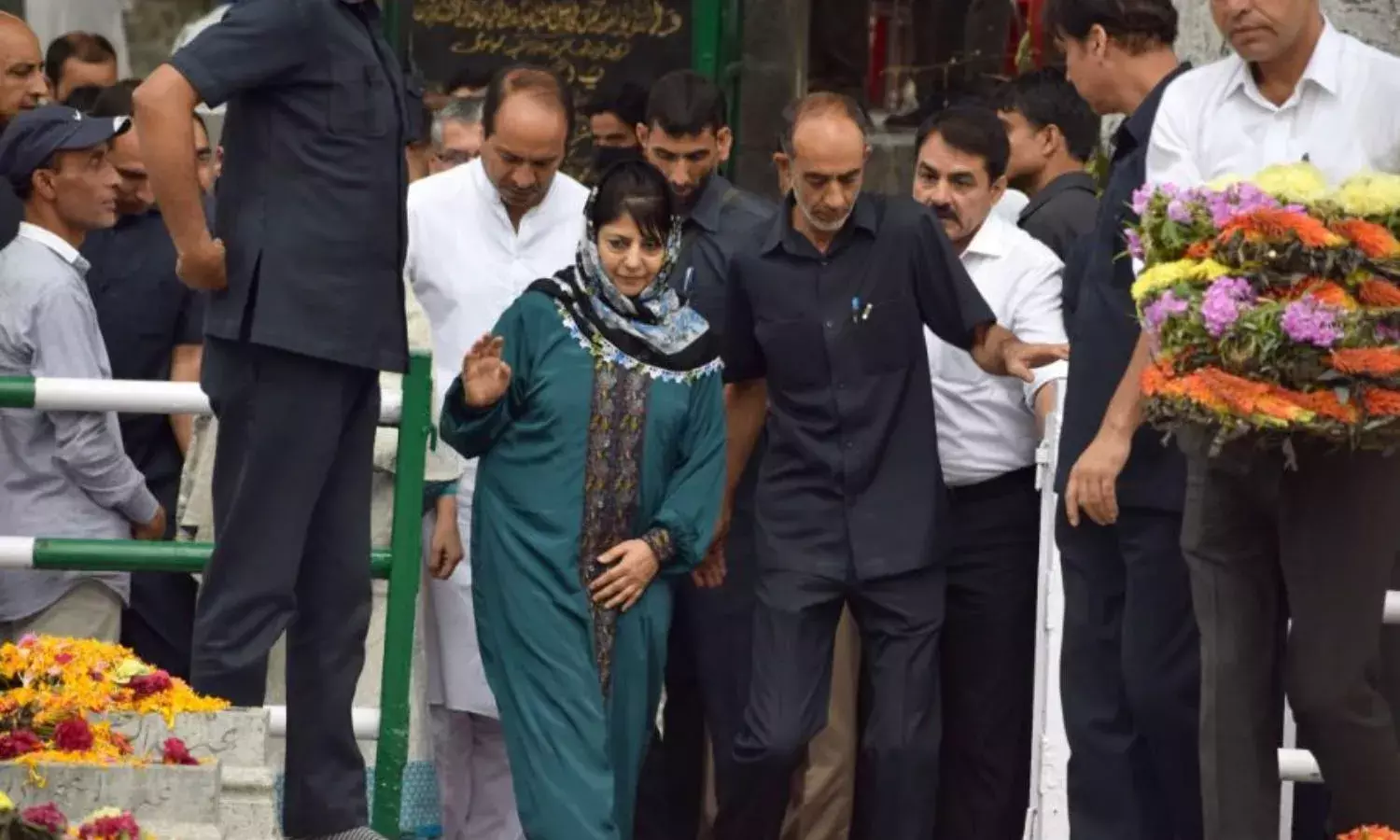Mehbooba Mufti Martyrs Day Warning to Delhi Little More Than Hot Air, No Takers In Kashmir
Mufti pays tribute to Jammu and Kashmir martyrs today(Photo: BASIT ZARGAR)

Mehbooba Mufti, Jammu and Kashmir’s former chief minister and president of her Peoples Democratic Party (PDP), on Friday warned New Delhi of dire consequences “if it (Delhi) engineers a split in the PDP.”
“In 1987 Delhi snatched the rights of Kashmiris and looted their vote. If Delhi does it again, I am afraid like we had a Salahuddin, a Yasin Malik in Kashmir then (suggesting something of that sort might happen again this time around)… No split can be engineered without Delhi’s intervention,” Mehbooba Mufti said on July 13, a day observed as Martyrs Day in the Kashmir Valley to commemorate the sacrifices of those who rose against the autocratic Dogra regime in 1931.
Mufti claimed that her party, PDP, is “strong” and perhaps intact as well but “there are problems inside the family which can be resolved.”
However, she added that “if Delhi interfered in all of this then I am of the view that what happened in 1987 and the manner in which votes of Kashmiris were looted and the MUF (Muslim United Front) was crushed, and if Delhi does it again by splitting the PDP, there will be dangerous consequences.”
Mufti’s latest statement is dangerous in content. Also, the timing of her statement is provocative for she chose to remind Delhi of Syed Salahuddin and Yasin Malik on July 13 Martyrs Day.
She almost warned that in case Delhi plays a role in splitting the PDP camp there could be another armed uprising in Kashmir. Is ithat really so?
She is again indulging in politics of deceit to hoodwink both Kashmir and Delhi.
To give an impression that all was hunky-dory in the state of Jammu and Kashmir before the massively rigged 1987 Legislative Assembly Elections is a concocted Kashmir narrative.
To argue that had the 1987 elections not been rigged in favour of the pro-autonomy National Conference, there would have been no anti-India movement in Jammu and Kashmir, is erroneous on multiple counts.
The popular armed struggle of 1989 was not an offshoot of the ‘87 rigged elections.
Who was Maqbool Butt then? Why was he hanged in Delhi’s notorious jail, Tihar, in 1984? For what? Which political ideology did he represent?
All narratives which ignore the historicity and context of the Kashmir dispute are not only flawed, but also superficial and self-defeating.
Multiple identities have played a significant role in mobilising public opinion throughout various political struggles in Jammu and Kashmir before and after the 1947 Partition?
What happened in Kashmir in 1989 did not happen in isolation. There was a regional context and also a global framework.
Arguing that the armed struggle that broke out in the Kashmir Valley was an angry response to the rigged elections of 1987 is a very naïve analysis of the Kashmir dispute. Much was happening in Kashmir. And too much was happening globally.
The decade in question was the 1990s and the event was the battle for Bosnia. At the start of the decade, the erstwhile Yugoslavia was crumbling into chaos and civil war. Germany witnessed the historic fall of the Berlin Wall.
Jammu and Kashmir’s former chief minister Mehbooba Mufti should stop behaving as chairperson of the United Jihad Council (UJC) and also stop making a fool of Kashmiris once out of power.
Flashback: When in opposition, mourning was Mehbooba Mufti’s politics. She would often visit the families of slain armed rebels; hug the women mourners gathered inside the erected tents for condolence. She would even shed a tear or two while expressing her sympathies with the bereaved family members.
Her hugs while in tears would make a perfect photograph for the newspapers next morning. This is how she built her political constituency in south Kashmir.
She gave an impression to the people of Kashmir that she was one among them, that she understood and felt her pain of losing a member to state violence and that she would do something significant to change Kashmir’s destiny forever.
Thus she began talking about the self-rule, opening of borders, same currency in both parts of Kashmir and a possible joint control mechanism of India and Pakistan to restore dignity and self esteem of Kashmiris both politically as well as emotionally. Then she also talked about the ‘healing touch’.
During her stint as chief minister over 350 civilians were killed by government forces in the Kashmir Valley.
On June 14 2018, the United Nations High Commissioner for Human Rights released a report on the situation of human rights in “Indian-Administered Jammu and Kashmir from June 2016 to April 2018, and general human rights concerns in Azad Jammu and Kashmir and Baltistan”. The UN report said that “in responding to demonstrations that started in July 2016, Indian security forces used excessive force that led to unlawful killings and a very high number of injuries. Civil society estimates are that 130 to 145 civilians were killed by security forces between mid-July 2016 and end of March 2018, and 16 to 20 civilians were killed by armed groups in the same period…”
Mehbooba Mufti’s theatrics won't work on Kashmir’s political landscape anymore. No one in Kashmir will pick up guns if the PDP vanishes into thin air!



